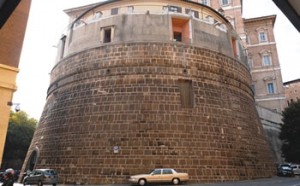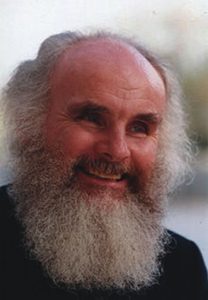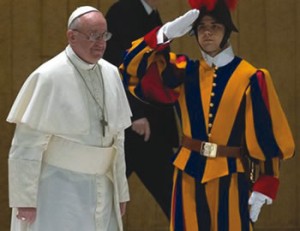Resignations – Benedict and Celestine
I have come to the certainty that my strengths, due to advanced age, are no longer suited to an adequate exercise of the Petrine Ministry…In order to govern the Barque of Saint Peter and proclaim the Gospel, both strength of mind and body are necessary. I have had to recognize my incapacity to fulfill adequately the ministry entrusted to me. Benedict XVI
How big was the surprise of Pope Benedict’s resignation? Perhaps to the press and to the world it was a surprise. But a man of Benedict’s rational competence, theological acumen, and concern for the Church would never make a decision like this without extensive reflection, consultation, and prayer.
His decision should not, however, have been such a surprise, at least to the press, after April 29, 2009, when he visited the Abruzzi region of Italy after an earthquake in the L’Aquila province killed 294 people. On this journey, Pope Benedict stopped at the Church of Santa Maria di Collemaggio and prayed at the glass coffin in which the bodily remains of Pope St. Celestine V (1219-1296) have been placed. After praying there, he made a striking gesture. He removed his Papal pallium, which he had first worn on the day of his inauguration as Pope. He placed it on the coffin, then left. Later that year he declared August 28, 2009 to August 29, 2010 the Year of Celestine V. On July 4, 2010, Pope Benedict again went to Pope St. Celestine V’s place of bodily internment to pray. Celestine V was the last Pope to resign for personal reasons.
Unable to Rule
Pope St. Celestine renounced the Papacy after five months in office because he felt he was incapable, under the circumstances, of properly executing the duties it prescribed that he undertake. Celestine was a 76-year-old hermit before becoming Pope, renowned for his holiness and Christ-likeness. The ordinary people of Rome cheered his election as Pope. He was well prepared to carry out the essential obligations of the office but not the modus operandi of the Petrine Ministry.
Benedict’s renunciation of the Petrine office and ministry is sober evidence that the structures, policies, procedures, and protocols presently governing its operation need serious evaluation, specifically in terms of their capacity to effectively translate into reality.
I submit that Pope Benedict’s decision to resign was made rationally necessary because of the non-essential trimmings
The “supreme law of the Church, is the salvation of souls” (Code of Canon Law #1747). Concomitant with this need is the equally important discernment as to whether the present operating structure of this ministry is a substantial help or a serious hindrance for any Pope “keeping before his eyes” (Code of Canon Law #1747), as his highest priority, “the supreme law of the Church.” What I am suggesting here is not meant to question, in any way, the Vatican I declaration on Papal infallibility and universal jurisdiction. It is meant to question, because reason demands it under the circumstances, whether the present organisation and processes of the Petrine Ministry are serving Jesus and His people as well as they should be. Except for a few elements, the structures, policies, procedures, and protocols of the contemporary Papacy are entirely man-made and not demanded by the Gospel. The power that erected these structures, enunciated these policies, put these procedures in place, and choreographed these protocols could alter them or remove them tomorrow if it chose to do so.
The office of the Papacy has inherited a myriad of structures, policies, procedures, and protocols, from which the Church and its Popes in different eras have selected various pieces they thought suitable for executing the Petrine Ministry in their particular time. Whether these are efficacious today—or even at the time selected—as means for achieving the end for which the Petrine Ministry exists (Canon#1747) is a matter of evaluation and judgment. But, no one should think—simply because some pieces survive—that these non-essential surviving components of the Petrine Ministry are any longer proficient pastoral means for realising the end which the Petrine Ministry is meant to serve.

The Institute for the Works of Religion, known as the Vatican bank, located in the Bastion of Nicholas V in the Vatican. (CNS/Catholic Press Photo)
Encyclopedias, Catholic and secular, record that Celestine resigned because he recognized his political and administrative incompetence. This is correct. But, no one suggests that he resigned because, as the Successor of Peter, he was unable to proclaim the Gospel faithfully by his words and his deeds. Celestine freely renounced the Chair of Peter, not because he was unable to authentically announce the Good News or unable to be the rock that confirmed and upheld people’s faith in Jesus Christ and His Way. Rather, it was because, to use the word from Celestine’s resignation declaration, he was unable to “rule.” However, as the renowned Catholic Biblical scholar, John L. McKenzie, S.J., stated and in his book Authority In The Church (Imprimatur, 1966):
“The vocabulary of both Greek and Aramaic is ample enough to permit Jesus, if He had wished, to say that those in authority in the Church should rule with justice and kindness; there are dozens of ways in which this could have been said. But such words as “rule” are exactly the words which He did not use.”
The Non-Essentials
A Successor of Peter can be as helpless and as weak as a man being crucified upside down and still be completely fulfilling the Petrine Ministry. The essential nature of the Petrine Ministry can be carried out completely by silent prayer in the “closet of infirmity”and/or by suffering love lived in anonymity. However, to have to daily walk-through the physical and moral gauntlet of non-essentials that have become de rigueur for the person serving in that Ministry, can undermine attention to and execution of the primary service to which Jesus commissioned Peter and his Successors.
Such non-essentials include, but are not limited to, being head of state, head of government, head of a bank, head of a militia; having to meet, daily and perfunctorily, with other heads of states, heads of governments, ambassadors, diplomats, and celebrities; having to personally appoint every Catholic bishop in the world; having to oversee the vast bureaucracy created supposedly to assist in managing the superfluity of the non-essentials; having constantly to preside at Pontifical High Liturgies that last hours, et al.
I submit that Pope Benedict’s decision to resign, like Pope Celestine’s decision to resign, was made rationally necessary, not by the essential and intrinsic responsibilities that the Successor of Peter is called upon by Jesus to fulfill, but rather because of the plethora of non-essential trimmings and trappings that have been added over the centuries and that today encrust the Petrine Ministry. They can easily become a major impediment to concentrating wholeheartedly on the Petrine Ministry’s raison d’être.
Fr Emmanuel Charles McCarthy is a priest of the Eastern Byzantine-Melkite Rite of the Catholic Church in union with Rome, an author and co-founder of Pax Christi-USA. He lives with his wife and large family in South Bend, Indiana.


 Entries(RSS)
Entries(RSS)